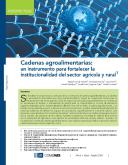Cadenas agroalimentarias: un instrumento para fortalecer la institucionalidad del sector agrícola y rural
Description
5 ref.
Abstract
Se describen las experiencias y enfoques de la constitución de cadenas agroalimentarias y se plantea la necesidad de desarrollar una nueva institucionalidad y formas de cooperación técnica para el fortalecimiento del sector agrícola y rural. Se espera que las cadenas agroalimentarias se constituyan en mecanismos de diálogo e instrumentos de gestión para la competitividad y la toma de decisiones según las demandas de los Estados Miembros del IICA. Para ello se define la cadena agroalimentaria y se brindan las características que le confieren sus actores económicos y sociales, mediante la participación de todos sus eslabones. Se definen los órganos de concertación, específicamente el “comité de cadena” y las funciones y características de la “secretaría de cadena”. Estas características son fundamentales para el éxito de los comités y la operación de las cadenas. También se plantea la necesidad de redefinir las funciones de los ministerios de agricultura como agentes de interrelación entre los sectores público - privado y la sociedad civil, a través de cadenas agroalimentarias, como espacio propicio para hallar soluciones comunes y permanentes para el sector agrícola y rural. This paper describes various experiences and approaches related to the creation of agrifood chains and suggests the need to develop a new institutional framework and forms of technical cooperation to strengthen the agricultural and rural sector. It is hoped that agrifood chains will serve as mechanisms for dialogue and as management tools to promote competitiveness and support decision-making, in line with the demands of IICA’s Member States. With this in mind, this document defines the nature of the agrifood chains and describes the characteristics conferred by their economic and social actors, through the participation of all the links. It also describes the consensus-building bodies, specifically the “chain committees,” as well as the functions and features of the “chain secretariat,” which are essential to the success of the committees and the operation of the chains. This paper also considers the need to redefine the functions of the ministries of agriculture, so that these institutions serve as agents that connect the public - private sectors and civil society through agrifood chains, as an appropriate space for finding common ground and permanent solutions for the agricultural and rural sector.
Keywords
Publisher
CATIE, Turrialba (Costa Rica)
URI (Permanet link to cite or share this item)
https://repositorio.catie.ac.cr/handle/11554/5844Collections
- Publicaciones y documentos [3815]


